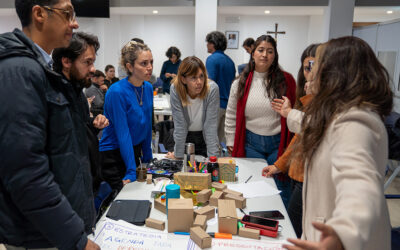 The title of the event was: “The merciful love of the Holy Trinity in the theological vision of Father Dumitru Stăniloae and of Chiara Lubich in the context of contemporary ecumenical dialogue”. Commenting on it, Professor Vasile Stanciu, Dean of the Faculty, said it expressed the depth of the subject endeavouring to compare the theology of one of the greatest Orthodox theologians of the last century, so Fr. Dumitru Stăniloae is considered, with the charism of Chiara Lubich.
The title of the event was: “The merciful love of the Holy Trinity in the theological vision of Father Dumitru Stăniloae and of Chiara Lubich in the context of contemporary ecumenical dialogue”. Commenting on it, Professor Vasile Stanciu, Dean of the Faculty, said it expressed the depth of the subject endeavouring to compare the theology of one of the greatest Orthodox theologians of the last century, so Fr. Dumitru Stăniloae is considered, with the charism of Chiara Lubich.
Theologians from three churches took part: Orthodox, Catholic and Lutheran. Five Romanian Orthodox Professors from the Theological Faculty of Cluj, Alba Iulia and Sibiu, and five from the Focolare Movement – from the Sophia University in Loppiano , from the Lucian Blaga University of Sibiu, from the Oriental Institute of Regensburg and from “Centro Uno” the Focolare’s secretariat for ecumenical dialogue.
The symposium began with a prayer and the greeting of Metropolitan Andrei in whose metropolitan area the meeting took place. The Orthodox Auxiliary Bishop, Somesanul Vasile, who participated at various times said: “Yet again, I can’t but be impressed by the warmth of the love with which you come to Cluj, the warmth we find every time and cherish in our being, in our daily life … we certainly try to transform that love into life, as did Fr. Stăniloae and Chiara Lubich”.
Experiences on mutual love of Orthodox and Catholics – young people, families, priests – emphasized that a life [of faith] is essential for Christians; theology understood in a very vital way and the path of ecumenism understood according to the trio of terms, “love – life – truth.” Stanciu highlighted the risk that theology can often remain at the level of theory and is difficult to put it into practice, it needs to be lived.
For Prof. Sonea, pro-dean of Cluj – “doing theology” is not an abstract discourse about God, but about the living God, in God and about God. This way of doing theology is specific to Chiara Lubich and provides an element on which we can build a dialogue that is not seeking the conversion of the other, but the discovery of the other. In the spirit of love we are in unity. We need to give a common witness to the world .
As pointed out by Prof. Stefan Tobler from Sibiu at the conclusion, in the radicalism of love and in theological rigor, “we really are together.”
Prof. Ruxandra from Bucharest testified that she knew both Chiara and Fr. Stăniloae. ” I met Chiara first, at a meeting of young people in Rome which revived my faith in God and brought me back to the Church. Then when I was a student I heard Fr. Stăniloae talk about the great love of God towards men and about the love from the heart of the Blessed Trinity, the model of supreme love, the model of love in the family. For me, as an Orthodox, it was amazing to see how Orthodox, Catholic, Lutheran and Reformed theologians have found a common spirituality in the thought of Chiara Lubich and of Father Dumitru Staniloae, both theologians of love. It was a wonderful experience.”
With this meeting another step forward has been taken, opening up new perspectives on this journey together.





0 Comments